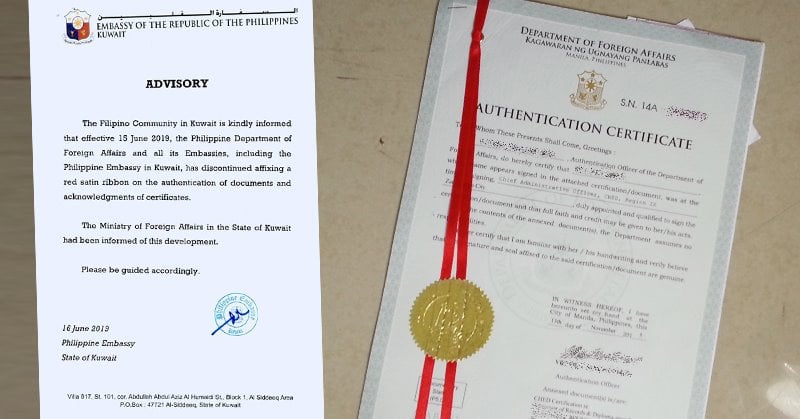Filipinos in Kuwait who may have a need for public documents such as Special Power of Attorney, Affidavits and other documents, to be legally acknowledged or consularized, can no longer seek for this service from the Philippine Embassy in Kuwait , as the government has applied some changes on this regard.
On May 14, 2019, the Hague Convention Abolishing the Requirement of Legalization for Foreign Public Documents (Apostille Convention) was officially adopted in the Philippines.
Also Read: How to Renew Philippine Passport in Kuwait

Philippine Embassy in Kuwait Advisory: No More ‘Red Ribbon’ Included for Public Documents
And on this regard, starting June 15, the Philippine Department of Foreign Affairs and all of its embassies, including the one in Kuwait, shall no longer affix a red satin ribbon for the authentication of documents and acknowledgment of certificates, as shared in a post by the Philippine Embassy in Kuwait.

As part of this new protocol, the DFA and all its subsectors will no longer issue authentication certificates with a red satin ribbon (also known as “red ribbon”); instead, an Apostille will now be affixed to documents for use abroad as a proof of authentication.
An apostille is a certificate that authenticates the origin of a public document, exactly just what a “red ribbon” does. However, an apostille is issued by a country that is party to the Apostille Convention to be used in another country which is also affiliated to the Convention.
Through the Apostille Convention, foreign public documents from Apostille-contracting countries no longer require authentication from Philippine Embassies and Consulates General in order to be recognized and accepted in the Philippines.
In the same manner, Philippine public documents do not need diplomatic or consular authentication in order to be used abroad in fellow Apostille-contracting countries.
The new system is expected to simplify the whole authentication procedure of documents for use abroad resulting to more convenience, less cost, and processing time for the applicants. However, this only applies if both the country where the public document was issued and the country where the public document is to be used are parties to the Convention.
Under the Apostille convention, documents will no longer require legalization by the Foreign Embassy if the country or territory of destination is already a member of the Apostille Convention. Once Apostillized, by the DFA, the document can be validly used in any and all Apostille-contracting countries included below:
GOODBYE RED RIBBON, HELLO APOSTILLE!
Effective today, the DFA will no longer issue Authentication Certificates with “red ribbon”, and will instead affix an Apostille to documents for use abroad.
Learn more via this Q&A: https://t.co/0UrDhx02QF#PHApostille#DFAinACTION pic.twitter.com/cPdCCNsPpU
— DFA Philippines (@DFAPHL) May 14, 2019
Other than the countries that are not covered by the Apostille Convention, the Philippine Apostille will also not apply to Austria, Finland, Germany and Greece. As per guidelines, documents from and to such countries will still require legalization by their Embassy or Consulate in the Philippines.
Moreover, the DFA Office of Consular Affairs shall be the main authority responsible for the implementation of the Apostille Convention. Additionally, the Supreme Court will play an important role in this transition since the Convention would necessitate changes of certain provisions of the Rules of Court regarding the use of foreign public documents.
The DFA, via their YouTube Channel, has provided this supplementary video to help explain the new change in the document processing for travel overseas: